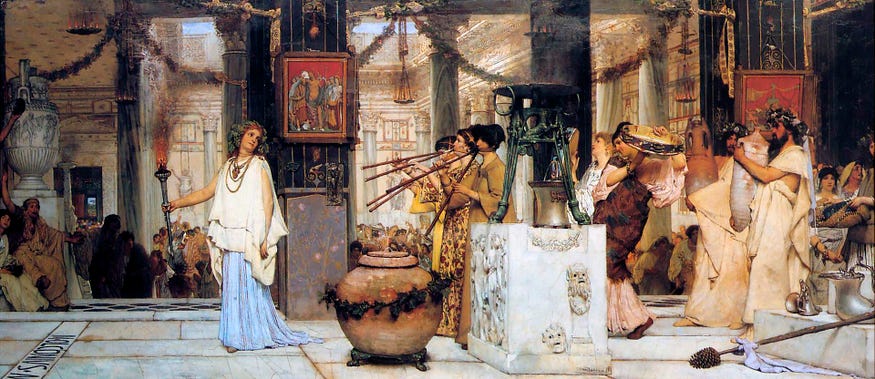Horace Nagila ("Hava Nagila" in Latin)

[Editor’s note: “Hava Nagila” is one of the greatest party songs in the world — and thanks to Nancy Llewellyn, there’s a Latin version of it. It’s not a translation so much as a complete reimagining, using verses from Horace and the Carmina Burana. “I wrote it back in the Early Aughts for performance at a faculty Christmas party at Loyola Marymount University in Los Angeles,” Llewellyn recalls. “The germ of it was simply the realization, some time before, that the opening line of the Cleopatra Ode fit the tune of Hava Nagila. There’s a kind of whirling delirium to Hava Nagila that seemed to fit the Roman celebrations — if not also the faculty party!” There are competing stories about the composition and origin of the song, which appears in its modern form in 1915 and is usually ascribed to Abraham Zevi Idelsohn, though it is clearly made up of traditional components — so traditional they fit Horatian meters!]
HORACE NAGILA (Idelsohn?/Nathanson? — Kaempfert?) (tr. Llewellyn) [1915]
Nunc est bibendum,
Nunc est saltandum,
Tellus pulsanda
Pede libero!
Nunc depromendum
Merum, cantandum,
Nunc coronanda
Cratera myrto!
Vides ut altæ stent
Nives in montibus —
Mox quoque frontibus
Acri hieme.
Quid sit futurum cras
Fuge scire, nefas.
Quo magis epulas,
Diem carpite!
CAR-PE, CAR-PE DI-EM
Carpe diem, carpe flores
Juventutis et amores.
Carpe diem, ne dicamus
Vobis vane “gaudeamus
igitur!” loquimur:
Fugit ætas invida.
Nunc est canendum:
Vinum laudandum.
Arma fuganda:
Pocula cano!
Nunc est ridendum.
Plena plaudandum
Voce tollenda
Laeto Massico!
Tibi perennius
Exigas ære;
Quid juvat mærere
Umbris aridis?
Pone, me mortuo,
caput sub dolio
in thermopolio
pleno Cæcubis!
BI-BANT, BI-BANT OM-NES
Bibant omnes sine meta
Tam professor quam poeta.
Potaturi salutamus
Te Lyæum; depellamus
Curas quas, Vita, das.
Nil curandum postero!
Sign up to receive email updates about new articles



Comment
Sign in with